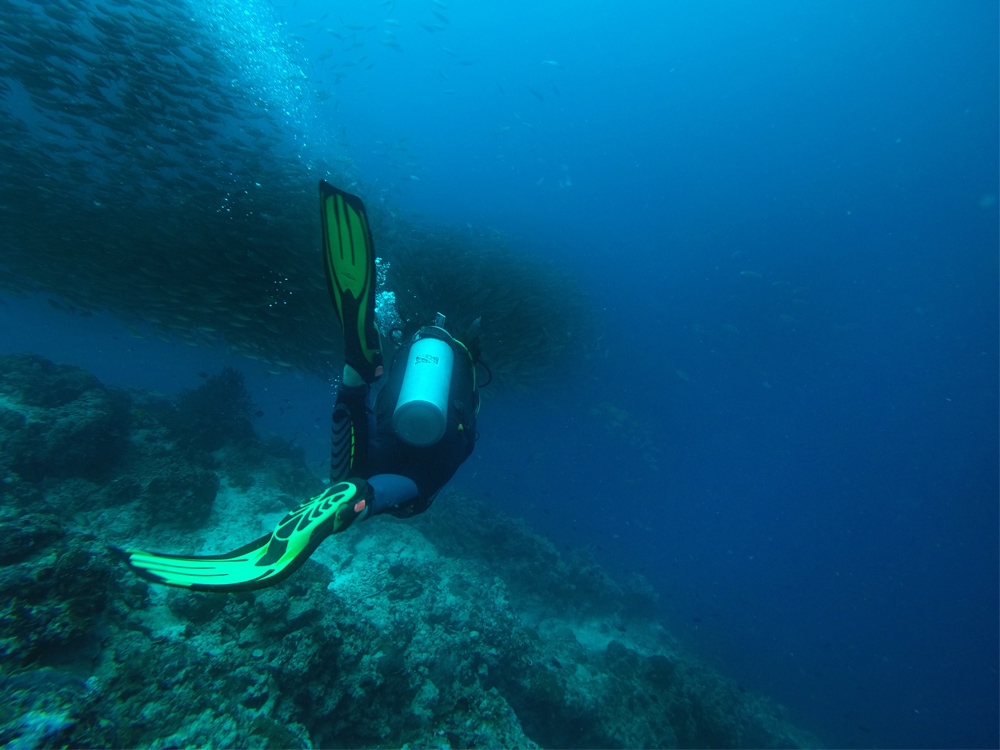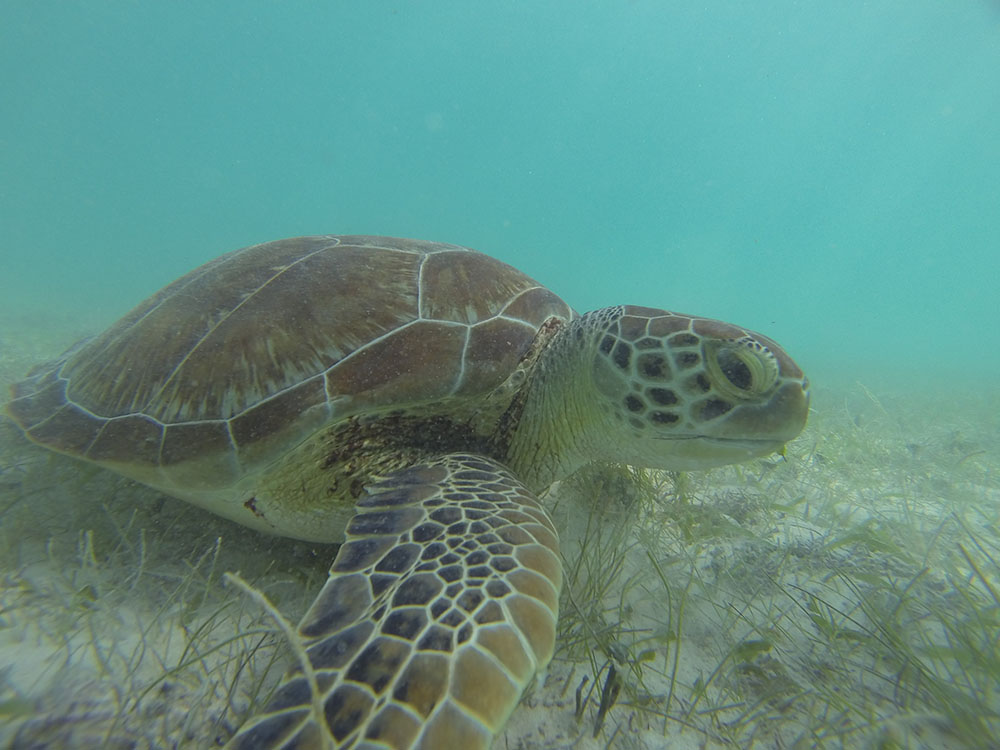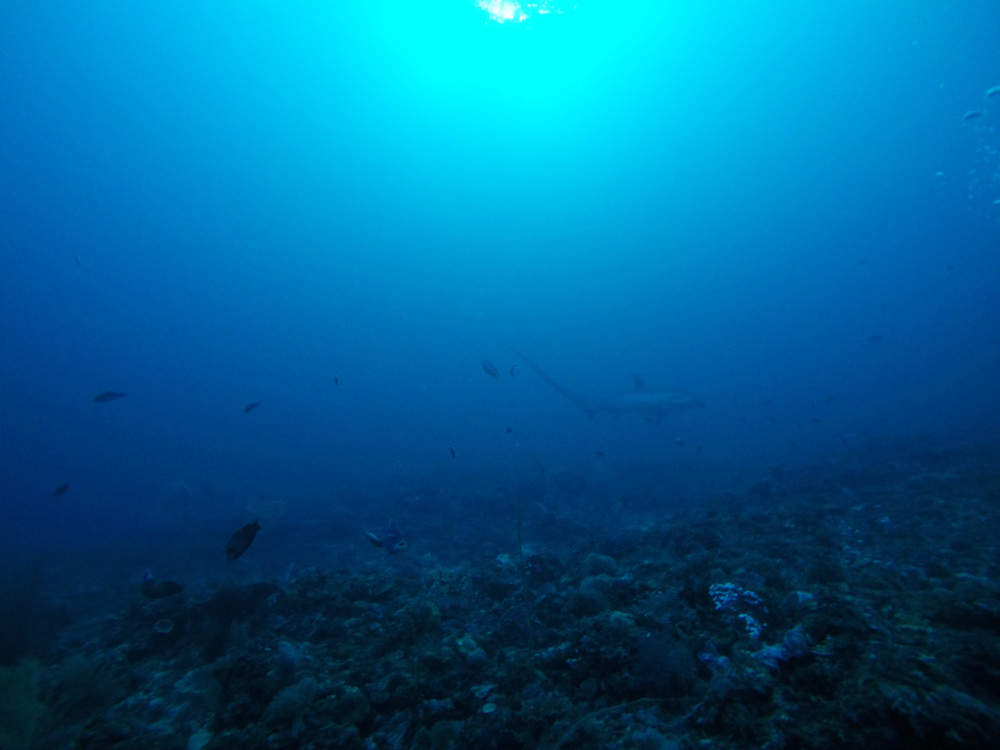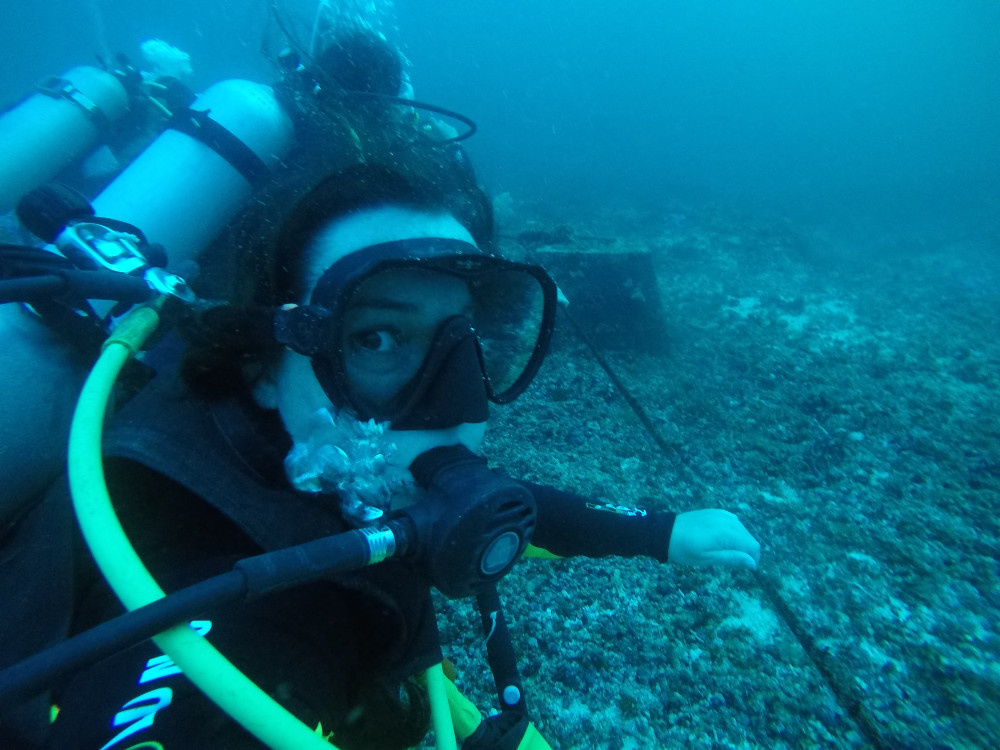Some of the links in this post are affiliate links. This means if you click on the link and purchase the item, I may receive an affiliate commission at no extra cost to you.
If you’ve recently fallen in love with scuba diving, you may be wondering how much does scuba instructors make. Whether this is out of genuine curiosity, or if you’re considering taking your scuba skills to the next level, this article is going to answer your questions.
Becoming a scuba diving instructor can be a rewarding career choice with no two days the same. However many aspiring scuba instructors may wonder about the financial aspects of this profession, including how much they can expect to earn annually in different countries.
The salary of a scuba instructor can vary widely depending on a variety of factors, including location, certification level, experience, and the types of scuba instruction they teach.
In this article we explore these factors in more detail, and provide insights into how much scuba diving instructors can expect an and different countries around the world.
Before you read on, here are my top 3 diving products:
If you want decent pictures but don’t want to spend thousands on underwater camera gear, opt for a Go Pro.
An affordable dive mask that you feel comfortable in. Opt for a mask with a black base, rather than a see through one.
A wetsuit with the zip at the back. It’s easier to get out of a back zipped wetsuit than it is one zipped at the front. Especially when wet!
What is the Average Scuba Instructor Salary?

Average scuba instructor salaries can vary greatly depending on various factors such as location, demand, certification level, and experience. In general, scuba instructors can expect to earn a median salary of around $35,000 to $45,000 per year. However, salaries can range from as low as $20,000 to over $100,000 annually.
Scuba Instructors who work in popular diving destinations such as Australia or the Caribbean, or those who specialise in technical or cave diving, may earn higher salaries. Additionally, instructors with advance certifications and extensive teaching experience are likely to earn more than those who are just starting out in the field.
Factors Affecting Scuba Instructor Salary
The salary of a scuba diving instructor can be influenced by various factors such as the location of the position, the instructors certification level, and the types of instruction to be taught.
Location is one of the most significant factors, as it can impact the demand for scuba instructors, and also be affected by the cost of living in different areas. Additionally, instructors with higher certification levels and more experience are often paid more than those starting out.
The type of scuba instruction needed can also impact a trainers salary, with specialty courses sometimes commanding higher fees than open water courses.
Location and Demand for Scuba Instructors
Location and demand are the most significant factors that can impact the salary of scuba instructors. The demand for scuba diving in an area can influence salary, with instructors in popular tourist destinations and good diving weather being more likely to get paid a higher salary.
In these areas, there may be more job opportunities for scuba instructors. Due to this, there’s more incentive for companies to pay more in order to attract diving instructors to their company. In contrast, in locations with less demand for scuba diving, there will be fewer job opportunities, which may lead to lower wages.
On top of this, the location of the job can also be impacted by the cost of living. For instance, dive instructors working in cities or towns with a higher cost of living may get offered higher salaries than those living in low cost areas.
Another factor related to location is the types of dives being offered in the area. Some areas will have higher demand for specialised instruction such as locations where technical or cave diving are popular. If you are able to teach these specialities, and apply for jobs in an area where they are popular, you’ll likely command a higher salary.
Certification Level and Experience of Scuba Instructors
Certification level and experience are both significant factors that can impact the salary of scuba diving instructors. As diving instructors gain experience and advance their certification levels, they may become more valuable to potential employers and can command higher salaries.
Generally, scuba instructors with higher certification levels and more experience, are paid higher than those starting out. Scuba instructors can obtain different levels of certification from various scuba diving organisations, such as PADI, NAUI, and SSI.
The highest level of certification is typically a master scuba diver trainer or course director, which requires extensive training, experience, and a proven track record of teaching scuba diving. PADI describes this as the ultimate recreational diver rating. Instructors with this certification are often in high demand and can and often earn more than those with lower certification levels.
Experience is another important factor that can impact the salary of scuba instructors. In general, instructors who have been teaching for longer periods are likely to earn more than those who are just beginning.
It’s worth noting that scuba instructing can be a seasonal job in many locations, with more demand during peak travel and weather seasons. As a result, scuba instructors may experience fluctuations in their income throughout the year.
Some divers might navigate this problem by moving around if they have the ability to do so. Alternatively you may want to pick an area that seems to be popular for scuba divers all year round.
Type of Scuba Diving Instruction
Scuba instructors can get paid differently depending on the type of scuba instruction they teach. While Open Water certifications are the most common scuba diving courses, there are also many speciality courses available, such as underwater photography, wreck diving, and nitrox diving.
Instructors who have specialised skills or certifications in these areas may be able to command higher fees for teaching these courses. However this is not always the case, especially in areas where these skills may be in low demand.
Teaching speciality courses can also provide additional income opportunities for dive instructors, as these courses typically have higher fees than open water course is. Additionally, instructors who are certified to teach technical diving courses, which require more extensive training and equipment, may be able to earn even higher fees for teaching these courses.
Scuba Instructor Salaries

How Much Do Scuba Instructors Make in the USA (including Hawaii)
Scuba instructors can make anywhere from $20,000 to $60,000, with the average being roughly $35,000. This is subject to the amount of hours and the location you work, as well as your skills and experience.
This is more than you’ll get paid for simply being a divemaster, and may be enough to live on in many parts of the US. However, you’ll want higher qualifications and experience to make $40,000+. You may earn higher than $60,000 in specialised situations.
In terms of locations for the best pay, luxury resorts in Hawaii will be your best bet. California is also a good choice.
How Much Do Scuba Instructors Make in Canada
Scuba instructors in Canada can expect to earn around $30,000 – $40,000 a year from their work. This can grow up to as much as $75,000 as you add more experience and specialty skills, though many jobs wont pay that high.
How Much Do Scuba Instructors Make in the Caribbean
It depends a lot on where you are in the Caribbean, but you may make between $15,000 and $25,000 while working as a dive instructor in the Caribbean.
How Much Do Scuba Instructors Make in Mexico and Belize?
A beginner scuba instructor may make around $8000 a year in Mexico, keeping in mind that the cost of living is much lower than in the US. This can rise to $15,000 as your experience and qualifications grow.
The above figures are similar to what you would get paid as a dive instructor in Belize. The cost is Belize is slightly higher than Mexico, but still much lower than the US.
How Much Do Scuba Instructors Make in Costa Rica?
Salaries in Costa Rica are a little hard to pin down, but the country seems to pay its dive instructors between $10,000 and $20,000 a year. Higher figures are mostly at the higher end resorts.
How Much Do Scuba Instructors Make in Honduras?
Utila and Roatan are quite popular places for new divers to get certified as they trapse their way through Central America. Therefore, it also has a lot of dive stores and dive instructors moving through.
Pay is largely seasonal, with monthly earnings of $800 to $1500 in the high season (Christmas to April), and dropping to half that in the rest of the year.
How Much Does a Scuba Instructor Make in the UK?
$23,000 is a common salary for dive instructors in the UK. Salaries can increase based on your experience and specialities, and also go higher if you work for the Navy or military. This can also increase by picking a diving hotspot, preferably one where you can get a job at a higher end resort.
How Much Does a Scuba Instructor Make in Australia and New Zealand?
The average salary for a diving instructor in Australia is approximately $65,000, with salaries mostly between 50,000 and 75,000 for your garden variety, experienced instructor. Special types of diving instructors can earn a lot more.
While this is a big jump from salaries elsewhere, keep in mind Australia has a higher cost of living than the US.
In New Zealand, scuba instructors can make $40,000 to $65,000 on average. New Zealand has a similar, but slightly lower cost of living compared to Australia.
How Much Do Diving Instructors Make in the Middle East
Diving instructors make between $15,000 to $25,000 in the Middle East. This is softened by a cheap cost of living in most areas, however renting can be expensive for expats due to regulations around where expats can live.
How Much Do Scuba Instructors Make in Southern Europe – Spain, Italy, Greece and France?
Average salary is 15,000-25,000 euros annually, although technical divers can make a bit more. Accommodation is sometimes included, so make sure you check before accepting one job over the other.
Most places will pay between 1100 and 1350 EUR a month. Highly skilled instructors, or those working at a fancy resort may earn more.
How Much Do Scuba Instructors Make in Thailand, Philippines, Malaysia and Indonesia?
You can expect to make between $10,000 to $25,000 in Thailand while working as a scuba instructor. Keeping in mind that you can live quite well in Thailand for a thousand a month, and live averagely on less than that, you can definitely get by on that amount.
In Philippines, many local dive instructors get paid up to $5000 a year. It’s a bit harder to gather accurate figures for international dive instructors, but a few salaries seen have been between $7,000 and $15,000 a year – the upper amount being in high end resorts. Accommodation is often included (dorm style).
For Indonesia the average you’ll get paid is $1,000 a month, but can be up to $2000 a month in hotspots such as Bali if you work on commission and get a lot of sign ups. You often will have to source your own accommodation as many centres wont give you a free room.
In Malaysia, often resorts will pay $800 a month for dive instructors, and some jobs include lodgings and some food.
How Much Do Scuba Instructors Make in Fiji and the South Pacific?
The average scuba instructor salary in Fiji and the South Pacific is around $11,000 to $25,000 annually. Cost of living is lower in Fiji and the South Pacific than in the states, but if possible opt for a job that includes accommodation. High end resorts are also a good option and should pay towards the higher end of the scale.
How Much Do Diving Instructors Make on Cruise Ships?
Diving instructors on cruise ships average between $15,000 and $25,000, and some may include accommodation and meals to boot.
How Can Scuba Instructors Earn More Money?
Change Locations
Changing locations can be a decent strategy for scuba instructors to earn more money. This is because the demand for scuba diving instruction can vary significantly depending on the location.
For example, popular tourist destinations may have a high demand for scuba diving instructors, which can lead to higher fees and more opportunities for paid work. In contrast, locations with a low demand for certifications may have fewer job opportunities unless work.
By moving to a location with higher demand for scuba diving instruction, or with higher wages, instructors may be able to increase their earning potential. Additionally, some locations may be very popular for scuba diving but have a low cost of living. This may be even more beneficial for diving instructors depending on their circumstances.
Improve or Add Specializations and Certifications
Scuba instructors can increase their earnings by obtaining higher qualifications. Scuba diving organisations offer various levels of certification, including master scuba diver trainer and course director, which require more extensive training and experience.
Instructors who achieve higher certification levels are often in high demand and can command higher fees for the services. Additionally, driving instructors who gain specialised skills or certifications such as technical dry diving or underwater photography, may be able to negotiate higher fees.
In general, scuba instructors who invest in their education and gain more experience overtime are likely to earn higher salaries, and have more opportunities for career advancement. Therefore, obtaining hire qualifications may be an effective strategy for scuba instructors looking to increase their income.
Starting Your Own Company
Starting your own scuba diving company is another a potential way for scuba instructors to earn more money. By starting their own company, they can set their own fees and control the amount of work that they take on.
Additionally, diving instructors who operate their own companies may be able to attract a higher end clientele by offering specialist services or unique experiences. This option is the hardest, however.
Starting a scuba diving company requires significant investment and effort, and owners must be able to manage administration tasks such as marketing & basic accounting.
Nevertheless, for instructors who are willing to put in the effort, starting their own company can be a viable strategy for increasing their earning potential, and getting more control over their career.
Work for the Military or Navy
Working as a dive instructor for the military or Navy can be a great option if you are highly skilled and have lots of experience. These jobs can pay around $55,000 to $90,000 a year.
Why Know Scuba Instructor Salaries?

There are several reasons why you might have typed this question into your favourite search engine.
You might be considering a career in scuba diving and want to know the earning potential of scuba instructors to determine if its a viable path for you. Understanding the salary range of a scuba instructor can help you set realistic expectations about your earning potential.
Knowing the range for salary can also help you when it comes to negotiating with a new company. By understanding the average salary range for your level of expertise and the location of your choosing, you can feel better knowing you’re paid fairly for your work.
Alternatively, you may be wanting to extend your vacation by working while overseas. For instance in Thailand, you may get paid less than you would in the UK, but now you’ll know that’s okay because cost of living is way cheaper. You also wont look silly by going into an interview expecting a salary much larger or lower than reasonable in certain countries.
Challenges of Working as a Scuba Diving Instructor

Seasonal Work and Irregular Income
The seasonal and irregular nature of scuba diving instruction jobs can create challenges for scuba instructors looking to have steady income. In many locations the demand for scuba diving instruction is highest during the summer months, while during the other times of the year demand can get much smaller.
This can lead to fluctuations in the income and periods of low or no work for scuba instructors. Additionally, diving instructors may also face challenges that come with scheduling when working in holiday destinations, as their work depends on people booking their courses
As a result, scuba diving instructors must be able to manage their finances carefully and plan ahead for periods of low demand. Those who are able to build a strong reputation online and through word of mouth, may be able to mitigate some of these challenges and maintain a stable income overtime.
Physical Demands of Scuba Instruction
Being a diving instructor can be physically demanding due to the nature of the work. Scuba instructors must be able to carry heavy equipment, setup and take down gear, and be able to spend extended periods of time in the water.
Scuba diving can be physically taxi due to the effects of water pressure, changes in temperature, and the need to maintain buoyancy and control while underwater. Instructors must also be able to respond quickly and effectively in emergency situations, which can require a high level of physical fitness and stamina.
Essentially, scuba instructors must be able to maintain their physical health and fitness in order to perform the job effectively and safely. This may include regular exercise, proper nutrition, and ongoing training to maintain skills and knowledge.
Limited Job Security and Benefits
Scuba instructors may face limited job security and benefits compared to other professions. Scuba diving instructors work as independent contractors, which means they are not entitled to benefits such as health insurance, paid-time-off, or retirement saving plans.
Additionally, the seasonal and irregular nature of scuba diving instruction can make it difficult to secure other long-term employment. Nevertheless, scuba instructors who are able to establish themselves as reputable and skilled professionals may be able to build a steady flow of clients and secure more stable employment overtime.
It’s important for instructors to carefully consider the financial implications of working as a scuba instructor, and plan accordingly to ensure they are able to meet financial obligations and save for the future.

Leave a Reply